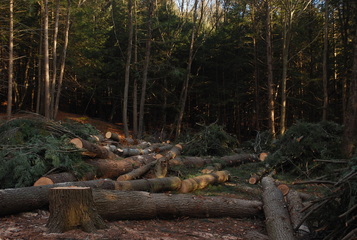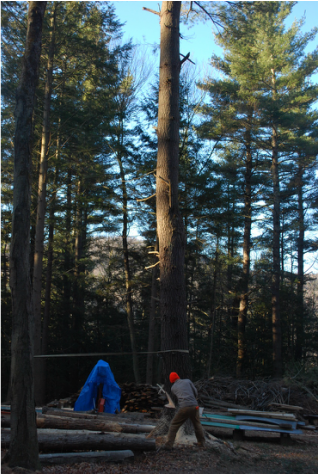 The mayhem that is the clearing of land. It's been two months since my last post, and in that time we've raised our house with an amazing outpouring of community effort, spent two weeks getting the first iteration of our roof set for the winter, and we now are spending all suitable weather clearing more around the house. This is a return to the first work we did here at the land, and it feels very familiar. This time, as opposed to before, we're going to have our heavy-machine operator of choice, Jim Herrick, use his excavator to compile our logs at the mill, and move some of the branches and stumps to the edge of the clearing. We'll most likely burn some brush (which we haven't done in the past) as well. The hand-rolling of logs with peaveys has been the most physically and emotionally taxing work of all, so we're going to save ourselves some stress there. And we've already ordered many apple trees from FedCo which will quickly be residing in newly opened niches of the topography. I've been thinking recently of how destructive we humans are just as a matter of existence. I don't intend that statement to carry negative connotation, to me it's a fact. I often like to think of how similar we are to beavers in the way we change our immediate environment to suit our preferential version of living, rather than adapting ourselves to wherever we happen to be. They help me to perceive it as one of the natural approaches to living on this planet. There is nothing necessarily good or bad about that preference it seems to me, rather, positive and negative results seem to be more related to the scope of that alteration, and how it fits in with it's particular habitat. Not unlike the beavers, Meggie and I are cutting down trees in order that we may use them to our benefit, and also utilize the space they once inhabited to provide room for our home and a micro-environment that suits our sustenance of choice. If you look at the picture accompanying the beginning of this entry, you see the current (as of a couple days ago) state of one part of our clearing efforts near the house. Even though I'm consciously deciding to proceed with the homestead in this way, the process looks incredibly destructive, because it is. We need to destroy, or end, the lives of many other things in order that our lives continue. It's hard to get around this basic principle in nature. If we accept this precept, and consider the scale of destruction and alteration required to support one human being in this current cultural context, I think it follows that we're way up at the top of the list of "Creatures Requiring the Most Resources." This is why I have the hardest time understanding the apparently assumed truism that more people is always a good circumstance, that reproducing is always a good choice, that economic and population growth are inherently good goals. Why can't we collectively see the faults in this logic? Population dynamics in all species of plants and animals work in cycles and balance. All species are limited by the same existent amounts of any given energy or resource. Historically, these dances of predator and prey circling around each other in abundance and lack have occurred in particular parts of the environment. Islands have often proven to be especially instructive since their borders of resources are so obvious and static. Now, I think it's time we consider the island that is the Earth. Our population trajectory is only a "success" story if you don't read the last chapter of the book, because we too, eventually reach that limit of resources. We can disagree about when that may happen, but no one can presume it won't without engaging in willful ignorance.  Here I end the life of an 80+ year old pine to help support my own. The human species certainly is clever if not wise. Over and over again we have figured out ways to inhabit every part of this planet whether hospitable or not, moving and removing resources from one place in support of another, hiding waste and decay out of sight and out of mind. It's so complex now that most people have very little or no idea of what it takes to support their life, and from how many different continents the needed resources are taken. Probably no one can understand it as a whole. But satellites and space junk notwithstanding, this entire play happens within the bounds of our planetary island. And our species' lives are not more precious or important than any others in this world. We are all subjected to the same limitations--hawks, chickadees, butterflies, efts, spider mites. How pressing these considerations are to you depend on how you think of the value of human life. Are two deaths twice as bad as one? Four deaths twice as bad as two? When the beavers exploit one region of habitat and their population surges just as the resources run out, they experience a population crash. This has happened to human cultures before too. But if we continue to tell ourselves that more of us is always better, we will ride that misconception onward past 10 billion people, and when that population crashes, well...you do the math.
9 Comments
|
Meggie
Recording moments from our journey on the Pacific Crest Trail. (All pre-2015 entries are Patrick's words on work and life at the homestead). Archives
March 2016
Categories |
 RSS Feed
RSS Feed
